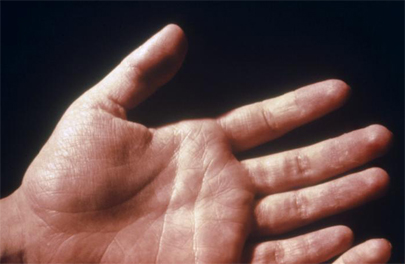Resumen
Definición
History and exam
Key diagnostic factors
- dor intensa difusa ou localizada em um membro
- febre
- edema ou eritema localizados
- hipotensão
- rash eritematoso difuso escarlatiniforme
Other diagnostic factors
- alterações agudas do estado mental
- sintomas tipo influenza
- sensibilidade e fraqueza muscular
- sintomas gastrointestinais
- sinais e sintomas de miocardite
- endoftalmite
- hipotermia
Risk factors
- diabetes mellitus
- transtornos decorrentes do uso de bebidas alcoólicas
- traumas menores e lesões com hematomas, formação de hematomas ou distensão muscular
- procedimentos cirúrgicos (por exemplo, parto vaginal, reconstrução da mama, parto cesáreo, histerectomia, lipossucção, bunionectomia)
- uso prolongado (>6 horas) do mesmo absorvente higiênico interno
- uso de absorventes higiênicos internos de alta absorção
- uso de anti-inflamatórios não esteroidais (AINEs)
- uso de esponjas vaginais, diafragmas e dispositivos intrauterinos (DIUs)
- faringite estreptocócica não tratada
Diagnostic tests
1st tests to order
- microscopia e cultura (sangue, ferida, líquido, tecido)
- Hemograma completo
- perfil de coagulação
- ureia e creatinina séricas
- urinálise
- TFHs
- creatina quinase (CK)
- cálcio sérico
- sódio sérico
- fósforo sérico
- albumina sérica
- ácido lático sérico
Tests to consider
- teste de anticorpos anti-Staphylococcus aureus
- radiografia torácica
Emerging tests
- sorotipagem
Treatment algorithm
suspeita de síndrome do choque tóxico
síndrome do choque tóxico estreptocócico confirmada
síndrome do choque tóxico estafilocócico confirmada: sensível à meticilina
síndrome do choque tóxico estafilocócico confirmada: resistente à meticilina
síndrome do choque tóxico clínico sem culturas confirmadas
Contributors
Authors
Brit Jeffrey Long, MD
Attending Physician
Associate Professor of Emergency Medicine
Department of Emergency Medicine
Brooke Army Medical Center
Fort Sam Houston
TX
Disclosures
BJL declares that he has no competing interests.
Acknowledgements
Dr Brit J. Long would like to gratefully acknowledge Dr Marie R. Baldisseri and Dr Walid Khayr, previous contributors to this topic.
Disclosures
MRB and WK declare they have no competing interests.
Peer reviewers
Mary Jane Reed, MD, FACS, FASMBS
Associate Professor
Department of Critical Care Medicine and Department of General Surgery
Geisinger Medical Center
Danville
PA
Disclosures
MJR declares that she has no competing interests.
Janice Zimmerman, MD
Head
Critical Care Division
The Methodist Hospital
Houston
TX
Disclosures
JZ declares that she has no competing interests.
Djillali Annane, MD, PhD
Professor in Medicine at University of Versailles SQY
Director of the General ICU at Raymond Poincaré Hospital (AP-HP)
Director of the Center for Clinical Research and Technology Innovation (INSERM)
Garches
France
Disclosures
DA is an author of a number of references cited in this topic.
Peer reviewer acknowledgements
BMJ Best Practice topics are updated on a rolling basis in line with developments in evidence and guidance. The peer reviewers listed here have reviewed the content at least once during the history of the topic.
Disclosures
Peer reviewer affiliations and disclosures pertain to the time of the review.
References
Key articles
Centers for Disease Control and Prevention. Streptococcal toxic shock syndrome (STSS): 2010 case definition. 2010 [internet publication].Full text
Evans L, Rhodes A, Alhazzani W, et al. Surviving sepsis campaign: international guidelines for management of sepsis and septic shock 2021. Crit Care Med. 2021 Nov 1;49(11):e1063-143.Full text Abstract
Stevens DL, Bisno AL, Chambers HF, et al. Practice guidelines for the diagnosis and management of skin and soft tissue infections: 2014 update by the Infectious Diseases Society of America. Clin Infect Dis. 2014 Jul 15;59(2):e10-52.Full text Abstract
Sartelli M, Guirao X, Hardcastle TC, et al. 2018 WSES/SIS-E consensus conference: recommendations for the management of skin and soft-tissue infections. World J Emerg Surg. 2018;13:58.Full text Abstract
Reference articles
A full list of sources referenced in this topic is available to users with access to all of BMJ Best Practice.

Differentials
- Sepse Gram-negativa
- Febre maculosa das Montanhas Rochosas (FMMR)
- Meningococcemia aguda
More DifferentialsGuidelines
- Surviving sepsis campaign: international guidelines for management of sepsis and septic shock: 2021
- Invasive group A streptococcal disease: management and chemoprophylaxis
More GuidelinesLog in or subscribe to access all of BMJ Best Practice
Use of this content is subject to our disclaimer